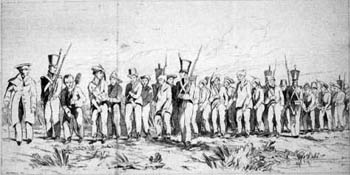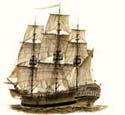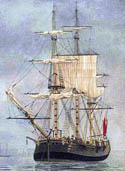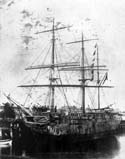Transportations
In 1788, the eleven ships of the First Fleet landed their 'cargo' of around 780 British convicts at Botany Bay in New South Wales. Two more convict fleets arrived in 1790 and 1791, and the first free settlers arrived in 1793.
From 1788 to 1823, the Colony of New South Wales was officially a penal colony comprised mainly of convicts, marines and the wives of the marines.
The early convicts were all sent to Botany Bay, but by the early 1800s they were also being sent directly to destinations such as Norfolk Island, Van Diemen's Land, Port Macquarie and Moreton Bay.

Chain gang
David Murrells
Hilda's 2nd Great grandfather
At the age of 36 he was convicted on the 6 Jan 1835 to seven and half years David Murrells was 36 years old when he was convicted of stealing at the
Essex Quarter Session in January 1835. He had no prior convictions and was sentenced to 14 years transportation.
Also Larceny before conviction
He was sent to New South Wales as an Australian convict on the Royal Sovereign 2 which set sale on 25th July 1835 and arrived12thDec1835, on 11th Mar in 1844
He was issued with a ticket of leave for the district of Port Stephens in 1841 and for Murrurundi in 1845. Free Settler or Felon in 1837 in Port Stephens
In 1847 he was convicted of Cattle stealing.
From Convicts of the Royal Sovereign records
David Murrells was 36 years old when he was convicted of stealing at the Essex Quarter Session in January 1835. He had no prior convictions and was sentenced to 14 years transportation. He was issued with a ticket of leave for the district of Port Stephens in 1841 and for Murrurundi in 1845.
In 1847 he was convicted of Cattle stealing.
Following is an account of the trial:
David Mars (Murrells) was indicted for stealing a bullock, the property of Francis Little at Scone on the 8th September 1847Mr. Purefoy appeared on behalf of the prisoner.
It appeared that about two years back a man named Job Hatherall, a stockman in the employment of Captain Dumar esq, sold a bullock to Mr. Francis Little. It was a red bullock inclined to brindle, brand FS off rump JH with D under of off ribs and 68 on off shoulder and an indistinct brand on the off rump apparently DNI. It was a working bullock called Captain. In September last Hatherall met the prisoner on Doughboy Hill having the bullock in his team on the off side. He asked prisoner where he got the bullock and prisoner replied that it was his own. Hatherall then said that it was Mr. Francis Little's property, when prisoner said that he was only bouncing. Hatherall then went to look at the bullocks brand, when prisoner told him that he was only a poor man, and begged him to say nothing about it; that one of his team had died and he was obliged to get another to carry him on the road. Hatherall told him that the bullock was the property of Mr. Francis little of Invermein and unless it was given up there and then other steps would assuredly be taken. Prisoner said he could not get on without the bullock and would not give it up.
Mr. Purefoy urged for the defense that there was no felonious taking in as much as there was no intention on prisoners part to make away with the bullock, but merely to use it to take him on the road for a time, when he afterwards intended to return him. He also questioned the identity of the bullock not being fully proved by the witnesses.
The Chairman, in summing up said that if the jury were convinced that the prisoner had taken the beast off the road merely to have a turn out of him they certainly could not find him guilty of stealing, but the evidence went to rebut such a presumption inasmuch as he had claimed the bullock as his own, when first taxed with stealing it
The jury after a short deliberation returned a verdict of guilt and the prisoner was sentenced to be worked in irons for three years.
Murrells Convicted and transported
Name |
Convicted Date |
Voyage Date |
Vessel |
Place of Conviction |
Daniel Murrells |
22 May 1832 |
11 Aug 1832 |
York |
Essex |
Ambrose Murrells |
3 Dec 1827 |
29 Apr 1828 |
Woodford |
Suffolk |
Alfred Murrell(s) |
22 Oct 1833 |
9 Apr 1834 |
Surrey |
Essex |
David Murrells |
6 Jan 1835 |
25 Jul 1835 |
Royal Sovereign |
Essex |
William Murrells |
21 Mar 1836 |
1 Aug 1836 |
Henry Porcher |
Sussex |
James Murrells |
22 Jun 1837 |
4 Oct 1837 |
Neptune |
Essex |
Charles Murrells |
3 Mar 1846 |
9 May 1846 |
John Calvin |
Essex |
Thomas Murrells |
27 Jul 1809 |
Aug 1811 |
Guildford |
Suffolk |
Solomaan Marles |
Sep 1791 |
Active |
Old Bailey |
|
Thos Murlagh |
May 1803 |
Rolla |
Mullingar |
|
William Levett |
||||
[William Murrell] |
31 Jul 1830 |
3 Mar 1831 |
Exmouth Kent, England |
|
Thomas Mitchel |
||||
[Thomas Murrell] |
13 Mar 1843 |
26 Aug 1843 |
Maitland Kent, England |
|
John Murrell |
||||
[James Murrell] |
12 Mar 1845 |
7 Jun 1845 |
Marion Suffolk, England |
|
John Murrell |
8 Mar 1813 |
Aug 1813 |
General Hewett |
Essex England |
Thomas Murrell |
31 Jul 1830 |
3 Mar 1831 |
Exmouth Kent, England |
|
Alfred Murrell |
22 Oct 1833 |
9 Apr 1834 |
Surrey Essex, England |
|
Dam Murrell |
4 Sep 1834 |
24 Apr 1835 |
Mangles Middlesex, England |
|
Daniel Murrell |
15 Jan 1828 |
27 Jun 1828 |
Marquess of Hastings |
Essex, England |
Daniel Murrell |
17 Jul 1820 |
Oct 1820 |
Prince of Orange |
Essex, England |
James Murrell |
23 Jul 1832 |
2 May 1833 |
Captain Cook |
Essex, England |
John Murrell |
16 Oct 1838 |
21 Nov 1839 |
Mangles Middlesex, England |
|
S Murrell |
1 Aug 1835 |
26 Oct 1835 |
Recovery |
Norfolk, England |
Samuel Murrell |
30 Nov 1833 |
13 Apr 1835 |
Marquis of Huntley |
Essex, England |
William Murrell |
26 Oct 1826 |
25 Jul 1827 |
Asia |
Middlesex, England |
William Murrell |
6 Dec 1797 |
Jun 1801 |
Nile |
Willsher Convicted and transported
| Name | Convicted Date | Voyage Date | Vessel | Place of Conviction |
John Willsher |
15 May 1848 |
27 Jun 1850 |
Nile |
Old Bailey, London, England |
John Willsher |
28 Nov 1848 |
9 Mar 1852 |
Fairlie |
Essex, England |
John Willsher |
26 Jul 1830 |
21 Mar 1831 |
Camden |
Essex, England |
Staines Convicted and transported
| Name | Convicted Date | Voyage Date | Vessel | Place of Conviction |
| Charles Staines | 15 Mar 1832 | 13 Jun 1832 | Planter | Suffolk, England |
| Daniel Staines | 15 Oct 1833 | 9 Apr 1834 | ||
| Elizabeth Staines | 15 Oct 1849 | 5 Apr 1850 | Barreto Junior | Sussex, England |
| George Staines | 15 Jan 1819 | Sep 1819 | Dromedary Cambridge | |
| James Staines | 27 Oct 1819 | 17 May 1823 | Albion | London, England |
| James Staines | 18 Oct 1836 | 6 Jun 1837 | Charles Kerr | |
| James Staines | 26 Mar 1836 | 1 Aug 1836 | Henry Porcher | |
| John Staines | 18 Oct 1832 | 8 Dec 1832 | Mangles | |
| John Staines | 19 Jul 1819 | Jul 1820 | Caledonia | |
| John Staines | 5 Mar 1845 | 27 Aug 1845 | Mayda | Essex, England |
| Joseph Staines | 6 Dec 1830 | 31 May 1831 | William Glen Anderson | Essex, England |
| Mary Ann Staines | 29 Nov 1832 | 4 May 1833 | Buffalo | Middlesex, England |
| Robert Staines | 15 Oct 1839 | 8 Jul 1840 | Eden | Kent, England |
| Samuel Staines | 9 Mar 1829 | 7 Oct 1829 | Katherine Stewart Forbes | Essex, England |
| Simon Staines | 20 Mar 1850 | 30 Dec 1853 | Sea Park | Cambridgeshire, England |
| Thomas Staines | 9 Mar 1822 | 19 Jun 1822 | Caledonia | Buckinghamshire, England |
| William Staines | 14 Oct 1834 | 18 Jun 1835 | Aurora | Essex, England |
Conditions on Board
Convicts were housed below decks on the prison deck and often further confined behind bars. In many cases they were restrained in chains and were only allowed on deck for fresh air and exercise. Conditions were cramped and they slept on hammocks. Very little information seems to be available about the layout of the convict ships, but a few books do contain artists' impressions and reproductions of images held in library collections.
Although the convicts of the first fleet arrived in relatively good condition, the same cannot be said for those that followed during the rest of the century. Cruel masters, harsh discipline and scurvy, dysentery and typhoid resulted in a huge loss of life.
After the English authorities began to review the system in 1801 the ships were despatched twice a year, at the end of May and the beginning of September, to avoid the dangerous winters of the southern hemisphere. Surgeons employed by the early contractors had to obey to the master of the ship and on later voyages were replaced by independent Surgeon Superintendents whose sole responsibility was for the well being of the convicts. As time went on, successful procedures were developed and the surgeons were supplied with explicit instructions as to how life on board was to be organised. By then the charterers were also paid a bonus to land the prisoners safe and sound at the end of the voyage.
By the time the exiles were being transported in the 1840s and onwards, a more enlightened routine was in place which even included the presence on board of a Religious Instructor to educate the convicts and attend to their spiritual needs.





